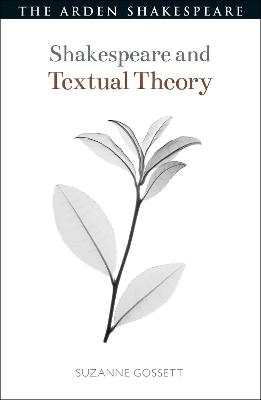
Shakespeare and Textual Theory
The Arden Shakespeare (Verlag)
978-1-350-12123-2 (ISBN)
After providing an introduction to early modern printing practices, Suzanne Gossett describes the original quartos and folios as well as the first collected editions. Subsequent sections summarize the work of the ‘New Bibliographers’ and the radical challenge to their technical analysis posed by poststructuralist theory, which undermined the presumed stability of author and text. Shakespeare and Textual Theory presents a balanced view of the current theoretical debates, which include the nature of the surviving texts we call Shakespeare’s; the relationship of the author ‘Shakespeare’ and of authorial intentions to any of these texts; the extent and nature of Shakespeare’s collaboration with others; and the best or most desirable way to present the texts - in editions or performances. The book is illustrated throughout with examples showing how theoretical decisions affect the text of Shakespeare’s plays, and case studies of Hamlet and Pericles demonstrate how different theories complicate both text and meaning, whether a play survives in one version or several. The conclusion summarizes the many ways in which beliefs about Shakespeare’s texts have changed over the centuries.
Suzanne Gossett is Professor Emerita of English at Loyola University Chicago, USA. Her publications include essays on theatrical collaboration, Shakespeare’s late plays, and textual editing. She is a General Textual Editor of the Norton Shakespeare, 3rd edition, and a General Editor of Arden Early Modern Drama. She has edited many plays by Shakespeare and his contemporaries, including Pericles and All’s Well That Ends Well for the Arden Shakespeare, Middleton’s A Fair Quarrel for the Collected Middleton, and Beaumont and Fletcher’s Philaster for Arden Early Modern Drama. She is a past president of the Shakespeare Association of America and, together with Dympna Callaghan, she edited Shakespeare in Our Time in honor of the 2016 anniversary year.
Series Editor’s Preface
Acknowledgements
Introduction
Part One: Textual Studies Before ‘Theory’
1 Shakespeare’s Texts From the Sixteenth to the
Nineteenth Century
The progress of an early modern play
The First Folio
Successive Folios
Early editions
Part Two: Twentieth-Century Theories
2 The New Bibliography
3 The Advent of Poststructuralism
4 Textual and Other Theories
Part Three: Current Debates
5 Authorship, Agency, and Intentionality
6 Attribution and Collaboration
External evidence
Internal evidence
Enlarging the canon
Theoretical implications
7 The (In)Stability of the Text
What if the printer went to lunch?
Why are some texts bad?
Why – and how and when – do some texts change?
8 Editing and Unediting
Editing Shakespeare
Editing collaborations
Unediting Shakespeare
Deciding on intervention
9 Book History and the Text
Shakespeare as literary dramatist
The creation of ‘Shakespeare’ through books
Readers, commonplacers and collectors
Women and Shakespeare books
Two material texts
10 Performance and the Text
Traces of early performance
Editing for performance
11 Textual Theories and Difficult Cases: Hamlet
and Pericles
Shakespeare’s texts and early editions
Enter the New Bibliography
The challenge of post-structuralism, or authorship,
authority, and intention
Textual and other theories
Attribution and collaboration
Printing unstable texts
Editing and unediting
Book history and the text
Performance and the text
Coda: The Immaterial Text
12 Textual Studies After the Digital Turn
References
Index
| Erscheinungsdatum | 11.02.2022 |
|---|---|
| Reihe/Serie | Shakespeare and Theory |
| Mitarbeit |
Herausgeber (Serie): Dr Evelyn Gajowski |
| Zusatzinfo | 6 bw illus |
| Verlagsort | London |
| Sprache | englisch |
| Maße | 129 x 198 mm |
| Gewicht | 284 g |
| Themenwelt | Geisteswissenschaften ► Sprach- / Literaturwissenschaft ► Anglistik / Amerikanistik |
| Geisteswissenschaften ► Sprach- / Literaturwissenschaft ► Literaturgeschichte | |
| Geisteswissenschaften ► Sprach- / Literaturwissenschaft ► Literaturwissenschaft | |
| ISBN-10 | 1-350-12123-1 / 1350121231 |
| ISBN-13 | 978-1-350-12123-2 / 9781350121232 |
| Zustand | Neuware |
| Haben Sie eine Frage zum Produkt? |
aus dem Bereich


